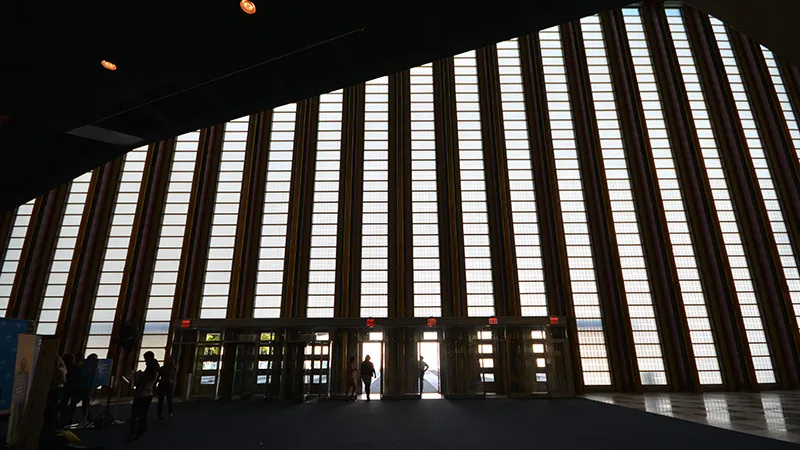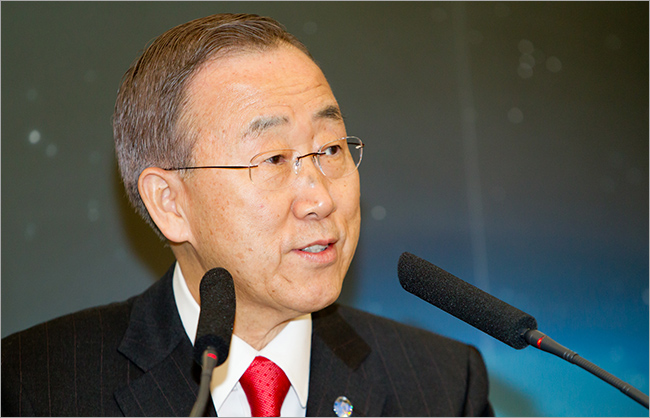
The process for selection of the ninth Secretary General (SG) of the United Nations who will succeed Dr. Ban Ki-moon, when his term expires on the last day of this year, is under way.
There are sparse rules governing the selection of the Secretary General of the world body. The only guiding text is Article 97 of the
United Nations Charter, which states: "The Secretary General shall be appointed by the General Assembly upon the recommendation of the Security Council." As a result, the selection is subject to the veto of any of the five permanent members of the
Security Council. In 1946, the
General Assembly adopted a resolution stating that it was "desirable for the Security Council to proffer one candidate only for the consideration of the General Assembly, and for debate on the nomination in the General Assembly to be avoided." The Wisnumurti Guidelines, named after the then Indonesian President of the Security Council Ambassador Nugroho Wisnumurti, were adopted in 1996 to provide greater clarity to working methods and rules during discussions in the Security Council on prospective candidates for the top job.
The Charter's scant treatment of the subject has since been supplemented by other procedural rules and accepted practices. Traditionally, candidates from the Permanent Five members of the Security Council (China, France, Russian Federation, United Kingdom, and United States) are not considered for the position of Secretary General to avoid further concentration of power in the hands of a single country. This is a matter of precedent and convention, rather than a written rule. It is also a matter of convention that the position is normally occupied by a representative of a small state and not a country that is politically, economically and militarily strong and powerful.
There is also the practice of regional representation according to which the position rotates between different regions. Eastern Europe is the only region within the UN system whose representative has so far not occupied the position of the top diplomat of the world body. Increasing number of commentators is hence speculating that the next SG could be from Eastern Europe. However, tension between Russia and Western permanent members over the
conflict in Ukraine has raised the possibility of deadlock over an Eastern European nominee, implying that candidates from other regions will come up for serious contestation. In any case, after expansion of the European Union (EU) in 2004 most countries, barring Russia, of the Eastern Europe Group are de facto part of Western Europe.
Since the position has been a male bastion during all the 70 years of UN existence, there is a growing chorus led by the USA, the UK and several others that the next SG should be a woman. Secretary General Ban has also expressed his preference for a woman to succeed him. He has, however, qualified that the decision rests with the Security Council and not with him.
 Courtesy: CTBTO Photostream/CC BY 2.0
Courtesy: CTBTO Photostream/CC BY 2.0
Traditionally, selection of SG has been an opaque and closed process working on the basis of straw polls — to determine which way the wind is blowing — amongst the 15 members of the UN Security Council.
There has been growing criticism of the opacity of the process, with increased calls by NGOs such as the
1 for 7 Billion campaign — which calls for a selection process that will find the best person for the job, irrespective of gender, region or background — and
The Elders — an international non-governmental organisation of public figures and elder statesmen, peace activists, and human rights advocates, brought together by Nelson Mandela in 2007 — as well as some states, for a more formal selection and appointment process in which candidates engage in a public and open discussion of their views and platforms.
Heeding calls for greater transparency, inclusiveness and openness, UN General Assembly (GA) has played a much more active role in the selection process this year. Countries were asked by SC and GA to nominate candidates. The candidates were advised to submit their resumes and to take part in informal briefings with the Assembly. In addition, the UN last month, held its first ever globally televised and webcast Townhall-style debate in the General Assembly Hall, where 10 of the 12 confirmed candidates took questions from diplomats and public at large.
To begin with, there were 12 candidates in the fray. One of them withdrew after the results of the first straw poll showed that she did not enjoy adequate support. Currently there are 11 candidates in the fray. Out of them five are women.
In the first of many expected informal closed-door, secret ballot straw polls on July 21, 2016, where members of the Council were asked to indicate whether they "encourage", "discourage" or had "no opinion" regarding the candidates. A second straw poll of the same nature was held on August 5, 2016, with a third currently scheduled for August 29, 2016. The list in descending order of number of "encourage" votes received is as follows:
| < style="color: #ffffff">CANDIDATE |
< style="color: #ffffff">ENCOURAGE |
< style="color: #ffffff">DISCOURAGE |
< style="color: #ffffff">NO OPINION |
< style="color: #ffffff">1st ROUND |
| Antonio Guterres, Portugal |
11 |
2 |
2 |
12-0-3 |
| Vuk Jeremic, Serbia |
8 |
4 |
3 |
9-5-1 |
| Susana Malcorra, Argentina |
8 |
6 |
1 |
7-4-4 |
| Danilo Turk, Slovenia |
7 |
5 |
3 |
11-2-2 |
| Irina Bokova, Bulgaria |
7 |
7 |
1 |
9-4-2 |
| Srgjan Kerim, Macedonia |
6 |
7 |
2 |
9-5-1 |
| Helen Clark, New Zealand |
6 |
8 |
1 |
8-5-2 |
| Christiana Figueres, Costa Rica |
5 |
8 |
2 |
5-5-5 |
| Igor Luksic, Montenegro |
2 |
6 |
7 |
3-7-5 |
| Miroslav Lajcak, Slovakia |
2 |
9 |
4 |
7-3-5 |
| Natalia Gherman, Moldova |
3 |
10 |
2 |
4-4-7 |
| Vesna Pusic, Croatia |
|
|
|
2-11-2 |
The second straw poll showed a slight shift in levels of support for various candidates, but placed António Guterres of Portugal at the top again as was the case at the end of the first poll. Yet once more, only one woman, this time Susana Malcorra of Argentina, was placed among the first three contestants.
Guterres, a former UN Refugee Agency chief and a former Prime Minister, hung on to his perch with 11 votes of "encourage", two "discourage" and two "no opinion". During the first poll, he had received 12 positive votes, no negatives and three no opinion. It would appear that his support is slightly faltering. It could spell real trouble if one of the ''discourage'' votes is from a P5 country.
The second round saw former Serbian Foreign Minister Vuk Jeremic rising from the fourth spot to take second place, with eight votes encouraging him, four discouraging and three expressing no opinion. Argentina’s Foreign Minister Susana Malcorra moved up from the seventh place to third place in the second round, garnering eight encouraging votes, six discourages and one no opinion.
Hopes for a woman to be elected are fading since no female candidate has emerged as the front-runner in the two straw polls conducted so far. Some surprises in the coming days can however not be ruled out. The Council will continue to hold straw polls until there is a majority candidate without a single veto from a permanent member of the Council. That name would then be officially transferred to the Assembly whose membership will formally select the candidate.
The work of the new SG is cut out for her/him. Not since the end of the Second World War has the international situation been so demanding and testing as today. There is a strong sense within the organisation that the next leader must be someone who can revitalise an institution seen as obtuse, unaccountable and ineffective. The UN has been criticised for its ineffectiveness in the face of the Syrian war, and damaged by scandals involving sexual abuse by peacekeepers in Africa. It was also seen as slow to respond to the Ebola outbreak.
The most demanding task for the new SG will be to get three permanent members of the Security Council — USA, Russia and China — on the same page while dealing with the formidable challenges that confront the world today. While Dr. Ban has been severely criticised for his ineffectiveness in dealing with problems in Syria, Libya, Yemen and Iraq, it needs to be borne in mind that the big powers with widely varying interests did not allow the UN to play its due role. Some critics do charge that Ban should have used the provisions of Article 99 to bring to the notice of UNSC that situation in Syria demanded urgent attention which he failed to do.
In addition to navigating the political differences amongst the big three members of the UNSC, the new SG will be required to redesign political missions and put in place robust peacekeeping operations in the Arab world to manage the raging conflict in Syria, Iraq, Libya and Yemen. He/she will have to act forcefully to quickly restore the heavily dented credibility of UN peacekeeping operations in Africa. In addition issues like climate change, terrorism, sustainable development goals, etc. will continue to demand considerable attention from the new chief.
The next few weeks are likely to bring greater clarity to who will don the mantle of the "most impossible" job in the world today.
The views expressed above belong to the author(s). ORF research and analyses now available on Telegram! Click here to access our curated content — blogs, longforms and interviews.



 The process for selection of the ninth Secretary General (SG) of the United Nations who will succeed Dr. Ban Ki-moon, when his term expires on the last day of this year, is under way.
There are sparse rules governing the selection of the Secretary General of the world body. The only guiding text is Article 97 of the
The process for selection of the ninth Secretary General (SG) of the United Nations who will succeed Dr. Ban Ki-moon, when his term expires on the last day of this year, is under way.
There are sparse rules governing the selection of the Secretary General of the world body. The only guiding text is Article 97 of the  Courtesy:
Courtesy:  PREV
PREV


